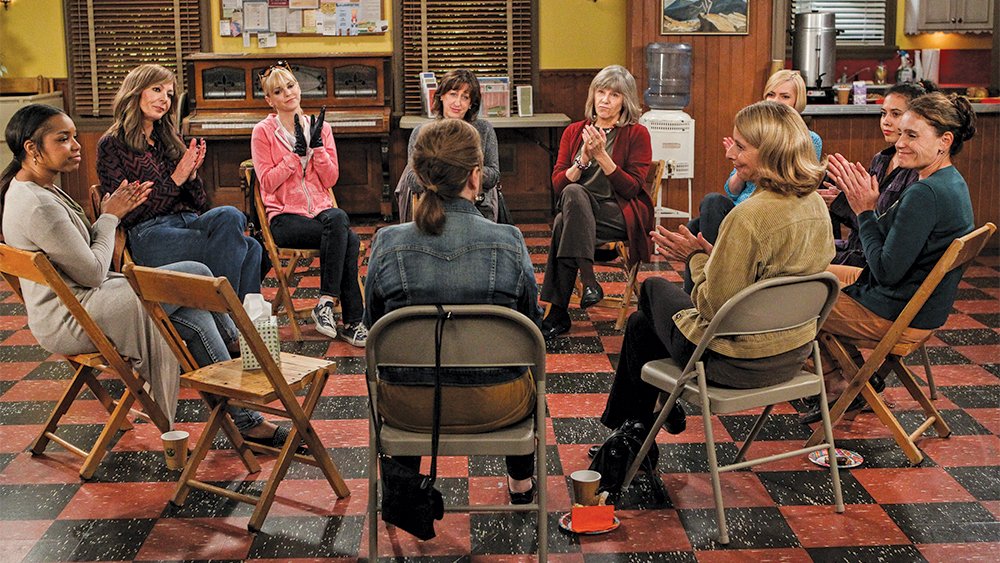I like streaming TV shows. No loud and frequently obnoxious advertisements, season continuity, being able to watch a show without sacrificing others – in short, I waste a lot of time on streaming sites. Usually, I regret binge-watching but watching CBS’ Mom, a show about women recovering from alcoholism and addiction, is a guiltless pleasure. Here’s why.
1. Allison Janney’s Bonnie – What a woman!
An actress who literally towers over her fellow cast members is unique. One who does this and is wonderfully comfortable in her own body is rarer still. Having seen tall and beautiful young relatives hunch over to avoid being called “bijli ka khamba”, to see Allison Janney use her loose-limbed, long-legged body to such wonderful effect in Mom is a delight! Moreover, Allison is a great actress.
Although she is usually well-dressed on the show, the image of her that stays with me is her hollow-eyed, hair-askew look after she first relapses. At that moment she isn’t the self-assured hustler. She is vulnerable, terrified, and devastated at having disappointed her daughter yet again. After playing a female White House chief of staff (an event that has yet to come to pass in real life) in The West Wing, Allison Janney takes on yet another unconventional starring role in Mom, that of Bonnie, a recovering addict who is susceptible to the temptation of alcohol and drugs.
She is loud and crude, is bisexual, is unabashed about her desires, gives offense and could generally be deemed annoying but is also persistent in her desire to improve her relationship with her daughter. She is a compassionate and reliable friend and enviably confident and pragmatic.
While at different times characters pursue romantic relationships, the show’s focus remains on the recovery process.
For instance, through the series Bonnie attends Alcoholics Anonymous (AA) meetings and credits the structure for her recovery, but at one point she is shown cruelly interrupting and shutting up another AA member, Mary (played by Mary Pat Gleason). This seems particularly wrong in the AA setup, where people are allowed the non-judgemental space to speak. In showcasing Bonnie’s likeable and unlikeable qualities, the writers of Mom give us a very believable woman. We begin to like her despite our reservations.
2. Romance Does Not Dominate The Lives Of These Women
Mom offers a seemingly unvarnished account of women moving away from addiction, a path that is fraught with numerous struggles. Temptations are everywhere in the form of hard-partying partners, multiple addictions (gambling, drugs, alcohol, and food), financial stress, and more. All of this is explored realistically and, largely, sensitively in 20-minute instalments served with humour.
It is difficult to believe the poverty narrative when the kids carry iPads but the show still offers moments worth remembering: spontaneous two-person AA style meetings in the living room in the middle of the night when it seems like the risk of teetering over the edge into the abyss of addiction is too great or the pain that comes from losing a fellow member (Jodi, played by Emily Osment) to an overdose.
Also read: Why I Am Not So Fond Of F.R.I.E.N.D.S Anymore
While at different times characters pursue romantic relationships and its attendant joy and trauma are chronicled, the show’s focus remains on the recovery process. Marjorie (played by Mimi Kennedy), doles out hard-won wisdom to the AA members after 30+ years of sobriety, but she still keeps going to meetings. We learn at one point that her sponsor who had 52 years sober relapsed. These women exemplify that sobriety involves lifelong work and is not an easy road.
3. The Wonderful Bond Of Sisterhood
When Mom started, it featured three generations of mothers and later even a fourth generation, when Bonnie’s mom (played by Ellen Burstyn) made an appearance. In fact, I remember being put off by the pilot because I thought it was a poor ‘Juno’. But over time, the show has expanded – from Season 5, the title track began to include other members of the AA. The show is now about a sisterhood that supports each other as its members deal with the slippery slope of sobriety, cancer, confronting the memory of a rape, ageing, jail terms, and more.
Each of the women has strengths and weaknesses and when one fails, the others rally around to help pick her up. Jill (Jamie Pressly) teams up with Wendy (Beth Hall) and Marjorie to help Bonnie when she relapses after being prescribed pain pills for a bad back. But Jill needs the help of Bonnie and others when she relapses.
The real, imperfect mothers on this show, struggling to get things right are heartening.
The AA meetings featured in the show seem to be of two types. One, where only women gather and the other where both men and women gather. While the characters speak at both meetings, the women-only spaces seem to be where the sharing is more intimate and personal and therefore, leading to valuable self-realizations. To me, this is a celebration of a supportive communal space women can create for themselves and is wonderful to see on screen.
4. It Is A Show About Older Women And Imperfect Mothers
It is wonderful to see a show headlined by women who are all as old as or older than me! In fact, Allison Janney (I keep coming back to her!) was 40, when she landed the role on The West Wing, which brought her fame. Thereafter, she won multiple awards for various performances, including an Oscar and at least two Primetime Emmys for Mom itself.
The 59-year-old actress has, in fact, been described as the patron saint of late bloomers. Mimi Kennedy is 70, Beth Hall is 60, Jamie Pressly and Anna Faris are both 40-plus. These women play their age and tackle menopause, sexuality, insecurity about looks, loneliness, and loss, together, helping each other out and their chemistry on screen is evident.
For someone who grew up watching the Nirupa Roy and Rima Lagoo model of motherhood, the real, imperfect mothers on this show, struggling to get things right are heartening. There are no simple happily ever-afters, because amends don’t always earn forgiveness and reconciliation. No one is a saint, no one is on a pedestal here. This is a human struggle to be better and to do better, incessant, like much of our lives.
5. The Show, Not Unlike Its Women, Is Imperfect But Important
The show is not without problems. Wendy, for instance, is a member of Mensa and a capable nurse but is a figure of fun outside her professional space. The stereotype of the ‘Black male criminal’ is preserved, with Christy’s rent money being stolen by a big, Black man! The series shows children seemingly repeating their mother’s mistakes, with early pregnancies and drug/alcohol use. The idea that this is a seemingly inescapable consequence and all due to the mothers is depressing.
Also, after Season 3, the children seem to disappear entirely from the narrative! Although the show is not about women constantly looking for romance, on one episode, the slightly built women lament the lack of a partner to spend Christmas with and talk of having cake as an act of giving up, the implication being that no one who gorge on cake and gain weight could attract a boyfriend! There are probably many more I might have missed.
The flaws aside, the show is indeed remarkable. A TV series largely about older women, with a woman writer and producer, tackling real and uncomfortable issues and offering plentiful laughs and memorable moments is a rare achievement. And there is a message for women, mothers or otherwise, that is encouraging – it’s ok to be imperfect, all of us are.
Also read: Eight TV Shows For The Feminist In You
Regina (Octavia Spencer) tells Bonnie early on, “I really don’t like you.” To which Bonnie replies, “That’s ok. I like myself enough for the both of us.” There’s a goal to aspire to – like ourselves enough for all those who don’t!
Featured Image Source: Variety
About the author(s)
Raji makes her living editing copy. She is sorting her thoughts and trying to be a little less ignorant each day.





Thank you for writing this. This and more have been on my kind since I started watching the show.
Thanks for writing about Mom! I binged it quite recently and I just love the show.
It’s so refreshing to watch a show about older women, especially when grappling with my own anxieties about ageing, lack of accomplishments and the other *wonderful* worries that rush in when turning thirty isn’t very far off in the horizon.